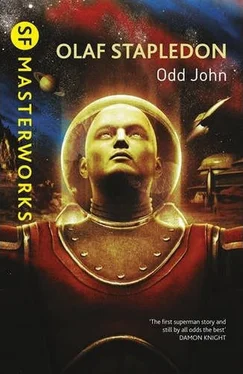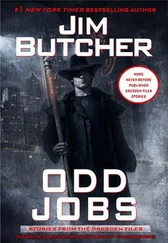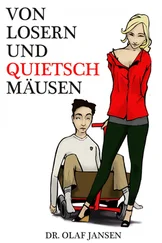Olaf Stapledon - Odd John
Здесь есть возможность читать онлайн «Olaf Stapledon - Odd John» весь текст электронной книги совершенно бесплатно (целиком полную версию без сокращений). В некоторых случаях можно слушать аудио, скачать через торрент в формате fb2 и присутствует краткое содержание. Город: London, Год выпуска: 2012, ISBN: 2012, Издательство: Hachette UK, Жанр: Фантастика и фэнтези, на английском языке. Описание произведения, (предисловие) а так же отзывы посетителей доступны на портале библиотеки ЛибКат.
- Название:Odd John
- Автор:
- Издательство:Hachette UK
- Жанр:
- Год:2012
- Город:London
- ISBN:9780450038570
- Рейтинг книги:5 / 5. Голосов: 1
-
Избранное:Добавить в избранное
- Отзывы:
-
Ваша оценка:
- 100
- 1
- 2
- 3
- 4
- 5
Odd John: краткое содержание, описание и аннотация
Предлагаем к чтению аннотацию, описание, краткое содержание или предисловие (зависит от того, что написал сам автор книги «Odd John»). Если вы не нашли необходимую информацию о книге — напишите в комментариях, мы постараемся отыскать её.
Odd John — читать онлайн бесплатно полную книгу (весь текст) целиком
Ниже представлен текст книги, разбитый по страницам. Система сохранения места последней прочитанной страницы, позволяет с удобством читать онлайн бесплатно книгу «Odd John», без необходимости каждый раз заново искать на чём Вы остановились. Поставьте закладку, и сможете в любой момент перейти на страницу, на которой закончили чтение.
Интервал:
Закладка:
For some time John continued to show me his inventions. I may mention a parsley cutter, a potato-peeler, a number of devices for using old razor-blades as penknife, scissors, and so on. Others, to repeat, were desfined never to be taken up, or never to become popular. Of these perhaps the most noteworthy was a startlingly efficient dodge for saving time and trouble in the watercloset. John himself had doubts about some, including the detachable pocket. “The trouble is,” he said, “that however good my inventions are, Homo sapiens may be too prejudiced to use them. I expect he’ll stick to his bloody pockets.”
The kettle was boiling, so he made the coffee and produced a noble cake, made by Pax.
While we were drinking and munching I asked him how he got all his plant. “It’s all paid for,” he said. “I came in for a bit of money. I’ll tell you about that some day. But I want much more money, and I’ll get it too.”
“You were lucky to find this cave,” I said. He laughed. “Find it, you chump! I made it. Dug it out with pick and spade and my own lily-white hands.” (At this point he reached out a grubby and sinewy bunch of tentacles for a biscuit.) “It was the hell of a grind, but it hardened my muscles.”
“And how did you transport the stuff, that lathe, for instance?”
“By sea, of course.”
“Not in the canoe!” I protested.
“Had it all sent to X,” he said, naming a little port on the other side of the estuary. “There’s a bloke over there who acts as my agent in little matters like that. He’s safe, because I know things about him that he doesn’t want the police to know. Well, he dumped the cases of parts on the shore over there one night while I pinched one of the Sailing Club’s cutters and took her over to fetch the stuff. It had to be done at spring tide, and of course the weather was all wrong. When I got the stuff over I nearly died lugging it up here from the shore, though it was all in small pieces. And I only just managed to get the cutter back to her moorings before dawn. Thank God that’s all over. Have another cup, won’t you?”
Toasting ourselves over the oil-stove, we now discussed the part which John intended me to play in his preposterous adventure. I was at first inclined to scoff at the whole project, but what with his diabolical persuasiveness and the fact that he had already achieved so much, I found myself agreeing to carry out my share of the plan. “You see,” he said, “all this stuff must be patented and the patents sold to manufacturers. It’s quite useless for a kid like me to interview patents agents and business men. That’s where you come in. You’re going to launch all these things, sometimes under your own name, sometimes under sham names. I don’t want people to know they all come from one little brain.”
“But, John,” I said, “I should get stung every time. I know nothing about the job.”
“That’s all right,” he answered. “I’ll tell you exactly what to do in each case. And if you do make a few mistakes, it doesn’t matter.”
One odd feature of the relationship which he had planned for us was that, though we expected to deal with large sums of money, there was not to be any regularized business arrangement between us, no formal agreernent about profit-sharing and liabilities. I suggested a written contract, but he dismissed the idea with contempt. “My dear man,” he said, “how could I enforce a contract against you without coming out of hiding, which I must not do on any account? Besides, I know perfectly well that so long as you keep in physical and mental health you’re entirely reliable. And you ought to know the same of me. This is to be a friendly show. You can take as much as you like of the dibs, when they begin to come in. I’ll bet my boots you won’t want to take half as much as your services are worth. Of course, if you start taking that girl of yours to the Riviera by air every week-end, we’ll have to begin regularizing things. But you won’t.”
I asked him about a banking account. “Oh,” he said, “I’ve had one running for some time at a London branch of the —— Bank. But the payments will have to be made to you at your bank mostly, so as to keep me dark. These gadgets are to go out as yours, not mine, and as the inventions of lots of imaginary people. You’re their agent.”
“But,” I protested, “don’t you see you’re giving me absolute power to swindle you out of the whole proceeds? Suppose I just use you? Suppose the taste of power goes to my head, and I collar everything? I’m only Homo sapiens , not Homo superior .” And for once I privately felt that John was perhaps not so superior after all.
John laughed delightedly at the title, but said, “My dear thing, you just won’t. No, no, I refuse to have any business arrangements. That would be too ‘sapient’ altogether. We should never be able to trust one another. Probably I’d cheat you all round, just for fun.”
“Oh, well,” I sighed, “you’ll keep accounts and see how the money goes.”
“Keep accounts, man! What in hell do I want with accounts? I keep ’em in my head, but never look at ’em.”
CHAPTER VII
FINANCIAL VENTURES
HENCEFORTH my own work was seriously interfered with by my increasing duties in connexion with John’s commercial enterprise. I spent a great deal of my time travelling about the country, visiting patent agents and manufacturers. Quite often John accompanied me. He had always to be introduced as “a young friend of mine who would so like to see the inside of a factory.” In this way he picked up a lot of knowledge of the powers and limitations of different kinds of machines, and was thus helped to produce easily manufacturable designs.
It was on these expeditions that I first came to realize that even John had his disability, his one blind spot, I called it. I approached these industrial gentlemen with painful consciousness that they could do what they liked with me. Generally I was kept from disaster by the advice of the patent agents, who, being primarily scientists, were on our side not only professionally but by sympathy. But quite often the manufacturer managed to get at me direct. On several of these occasions I was pretty badly stung. Nevertheless, I learned in time to be more able to hold my own with the commercial mind. John, on the other hand, seemed incapable of believing that these people were actually less interested in producing ingenious articles than in getting the better of us, and of every one else. Of course, he knew intellectually that it was so. He was as contemptuous of the morality as of the intelligence of Homo sapiens . But he could not “feel it in his bones” that men could really “be such fools as to care so much about sheer money-making as a game of skill.” Like any other boy, he could well appreciate the thrill of beating a rival in personal combat, and the thrill of triumph in practical invention. But the battle of industrial competition made no appeal whatever to him, and it took him many months of bitter experience to realize how much it meant to most men. Though he was himself in the thick of a great commercial adventure, he never felt the fascination of business undertakings as such. Though he could enter zestfully into most of man’s instinctive and primitive passions, the more artificial manifestations of those passions, and in particular the lust of economic individualism, found no spontaneous echo in him. In time, of course, he learned to expect men to manifest such passions, and he acquired the technique of dealing with them. But he regarded the whole commercial world with a contempt which suggested now the child, and now the philosopher. He was at once below it and above it.
Читать дальшеИнтервал:
Закладка:
Похожие книги на «Odd John»
Представляем Вашему вниманию похожие книги на «Odd John» списком для выбора. Мы отобрали схожую по названию и смыслу литературу в надежде предоставить читателям больше вариантов отыскать новые, интересные, ещё непрочитанные произведения.
Обсуждение, отзывы о книге «Odd John» и просто собственные мнения читателей. Оставьте ваши комментарии, напишите, что Вы думаете о произведении, его смысле или главных героях. Укажите что конкретно понравилось, а что нет, и почему Вы так считаете.












